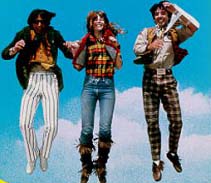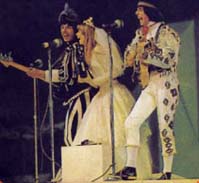OS MUTANTES - DOIS MIL E UM
 |
 |
By Dave Cross (April 2000)
Soon after in 1999, New York's Omplatten Label released the first three Os Mutantes LP's and, way after the fact, there was an oddly paced but excellent compilation released by Luaka Bop. The music of Os Mutantes was a classic psychedelic mesh of styles. While the band was working with Tropicalia uber-producer Rodrigio Duprat the sound was solid Syd Floyd, LSD sweetend Mama and Papa harmonies and sometimes even Janis (sans VD). They could mockingly sound like "The Girl Fron Impanema", Cage, The Mothers, the metric ryhthm shuffle of The Airplane...
But to fully understand Os Mutantes, you must first try to understand Brazil, 1968. The Right Wing military overthrow of 1964 had not been entirely successful. Through the succession of four (or more) leaders over the years leading up to 1968 there was large student unrest, rampant inflation, huge industrialisation - the place was on fire, like every other place in 1968.
It is clear that the parents of Os Mutantes were well heeled and sophisticated. The band was not an MPB radio band, Os Mutantes were TV stars. The band appeared weekly on the television show "The Small World of Ronnie Von." Ronnie Von being the boys in the band's Godfather. By that point Os Mutantes and their friends were being watched by military authorities but continued to send their confusing message out to the kids of Brazil. Military censors would frequently block screen time of many television shows, interrupting the show with the word CENSORED filling the screen. The Mutantes were not sending a direct message. The authourities knew they were up to something but didn't know what.
Sao Paulo eventually got too hot for the Mutantes so they headed for the hills. They set up a commune way outside of town, and that's where things get real freaky. After the band hit the commune scene, the fabric of the group was starting to unravel. Combine all manner of weird drugs (just as hard and weird as they come), a generally filthy living situation (remember, these were Brazilian society kids) and the continued threat of government derailment. Arnaldo was really getting out there. Rita was really getting out there. Sergio sat back and watched to see what would happen next. The music on the bands third album was stronger than ever (less studio flash, more primal rock pull) and the band then tours Europe. On returning, the record company asks Rita to record a solo album, she does. Arnaldo produces it. That album (Today Is the First Day Of the Rest Of Your Life) is considered by many to be the best Mutantes record, with its sense of control, drama and deep sadness. In 1971 the real Mutantes had said goodbye.
Arnaldo left in 1973 and his first solo
album Loki is one of those frightening one man and a lot of drugs atmosphere
albums like Flies On Sherbert, Oar or Barrett. Arnaldo had severely damaged
himself with the drugs; he would never be the same. Sergio plugged on with
the band until 1978, when after two years without a release, the band sounded
more like Yes than the original, sweet teenagers on television. It was
time to call it quits.
Sergio Dias Interviewed by Dave Cross
Q: It several of the founding Tropicalistas were Bahian. I'm not clear on the early background of you folks, but I do not believe you to be from Bahia. Can you please t ell me about your early influences or experiences that impacted the future Mutantes?
The so-called recipe was the fact that we Mutantes where born in Sao Paulo - very urbane and cosmopolitan. Both our parents were extremely creative- my mom is the first woman in the world to write and orchestrate a concerto for Piano and Orchestra. I grew up in the Municipal theatre watching her receive standing ovations and having to come back 11 times to stage. My dad was a great writer. He also helped in some of the "heaviest" lyrics of the Mutantes. Most of the onomatopaican work came from him, also he was a great opera singer. You can hear him in some "backward tapes" in some of our albums. We were very technologically oriented, for my oldest brother Claudio is a real genius in electronics and the builder of most of our gismos. We had a great exposure to the world culture via friends of my family, NASA, any kind
of research that we could hear about we had to know it.
Q: Please tell me about television's effect on the MPB. How did television impact the Mutantes and vice versa?
I believe we're part of the historical growth of Brazilian TV. We did more for them than they did for us- let's say we helped each other out. We had the image they had the means. Regarding the MPB I believe the "festivals" at the time did the big push for the entire revolution in the social - music era of the '60s.
Q: The Beatles are an obvious influence on Mutantes, Jimi Hendrix as well, but the Mutantes took these influences and turned them into something altogether different. What musical, literary and artistic influences were visited and revisited by your group?
Everything! You can hear Verdi's Aida mixed with Ben Hur on the intro for "Don Quixote." We've heard it all and we've used it all... there's Sly and the Family Stone, The Ventures, Shadows, the great Duane Eddy, Back, Rita Pavone, Suzy Quatro, boy... everything...
Q: Sex, magic and drugs were a powerful combination of influences on your group. Do you think they helped you develop who you were musically (and personally) or would that have happened anyway?
I believe the most happy time was when all this complication of sex and drugs were out of the way then we had only magic...
Q: Your lifestyle made you seemingly dangerous to your government. A few Tropicalistas were hunted down and temporarily removed from Brazil because of the perceived threat of evolution. Did the government hunt you down for being a rock musician?
Yes, we had to hide and had several threats. I believe our image of being clean and young helped us to get away with it but I know we were a stone in their shoes...
Q: What is the single most subversive act perpetrated by the Mutantes?
I don't know how can you understand the craziness of a torturer? Or how can we predict what would offend them the most? We never changed our lyrics if censured we mutilated them putting noises over it like "Cabeludo Patriota" where we sing my hair is of yellow and green and my beard blue
(which refers to the flag) and we mutilated this one.
Q: Did the AI5 effectively wipe out the Tropicalista intellectual movement?
Yes, they did succeed on destroying one entire maybe two generations regarding the intellectual and will of power to do and create art and politics, Brazil is now a pitiful resemblance of what once it was. I see the young generation very conformed and too busy avoiding bullet shots from
the drug dealers or the police, or just trying to find a way out of the economical disaster of a grim future... The level of corruption in the country is very high, something like the same process when you guys had the coup of '63, killing Kennedy and growing the arms Mafia and corrupting the ideals of Thomas Jefferson and all the others who helped to create the
great idea of the United States.
Q: How would you like Tropicalia to be remembered?
Revolution, spontaneous wild fire of youth, raw sexuality and freedom, and after all a huge amount of love and idealism.
AI5 - Acto Instution #5. The 1968 military clampdown on Brazil. Temporarily ended free speech in Brazilian media. 5 days after the passing of AI5 two of the Tropicalistas, Gilberto Gil and Caetano Veloso, were arrested, shaved and exiled to freezing England.
Tropicalia - The more Brazilian style of Psychedelia. Not only features pop music, but visual art, literature and performance type arts and artists.
Arnaldo Baptista - Bass and keys. Took drugs. Went nuts after Rita dumped him. Recorded a half dozen solo lp's after his tenure in Os Mutantes, some with varied results. Attempted suicide in 1983, but runs a Sao Paulo T-shirt business today.
Claudio Baptista - Big brother to Arnaldo and Sergio. Claudio was the mad scientist of the group, providing all the far out contraptions that the band would need to make their racket with.
Rita Lee - Singer, writer, costume and style designs of the band. Took drugs. Planned to poison Sao Paulos' water supply with LSD in 1968. Beauty, brains and she looked white. Rita has had a long career in Brazilian pop music, peaking in 1978 with "La Parfuma" Rita's deep throat disco tribute to Amyl Nitrate, selling a half million copies (no mean feat in Brazil). Shortly thereafere, pregnant Rita was arrested for marijuana distribution. Still beautiful though she's an old bat. (ED NOTE: Watch it, Dave- you're gonna be an old fart soon. To be more precise "Rita refused to do any more interviews with Americans after being presented with mine")
Sergio Dias - Sergio was the musician of the group. Sergio could hit classical fugue or complete and utter retardation. "Oh, Unfaithful Woman" is one of the most spastic, off the hook guitar solos that could be imagined. It's Sergio in the cape on cover of the first record.
Caetano Veloso - Popstar. Experimented sexually. One of the two key cornerstones to Tropicalia. Caetano went from casual sex MPB boy vocalist to being considered a full on theat to the government. Currently records bland movie soundtracks.
Gilberto Gil - The big daddy of Tropicalia. He knew what he was doing and he could talk about it intellegently. Both Gil and Veloso were from rural Bahia, both starting with a redneck romeo type persona, changing quickly after Sgt. Pepper. Proud owner of 41 Grammys.
Tom Ze - Nutcase. Capital Nut, capital Case. Wrote a couple songs with Rita on the first couple records. He was a little older and you have to wonder what he was doing hanging around with teenage girls. He plays the drill as a musical instrument. Recently toured with American bore rockers Tortoise.
Rogerio Duprat - The mastermind record producer of all of the good LPs by the above artists. Duprat's name on an LP is a sure trademark of quality and you should buy it on the spot. Criminally uncredited on the Omplatten reissues.